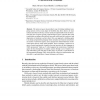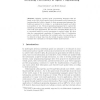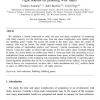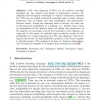272 search results - page 9 / 55 » Programming languages capturing complexity classes |
132
click to vote
ZUM
2000
Springer
15 years 5 months ago
2000
Springer
Abstract. The notion of agents has provided a way of imbuing traditional computing systems with an extra degree of flexibility that allows them to be more resilient and robust in t...
126
click to vote
DALT
2005
Springer
15 years 7 months ago
2005
Springer
Existing cognitive agent programming languages that are based on the BDI model employ logical representation and reasoning for implementing the beliefs of agents. In these programm...
108
Voted
OOPSLA
2004
Springer
15 years 7 months ago
2004
Springer
Generics offer significant software engineering benefits since they provide code reuse without compromising type safety. Thus generics will be added to the Java language in the...
107
Voted
ICALP
1994
Springer
15 years 6 months ago
1994
Springer
We introduce a formal framework to study the time and space complexity of computing with faulty memory. For the fault-free case, time and space complexities were studied using the...
123
click to vote
ER
2010
Springer
15 years 8 days ago
2010
Springer
UML class diagrams (UCDs) are the de-facto standard formalism for the analysis and design of information systems. By adopting formal language techniques to capture constraints expr...




